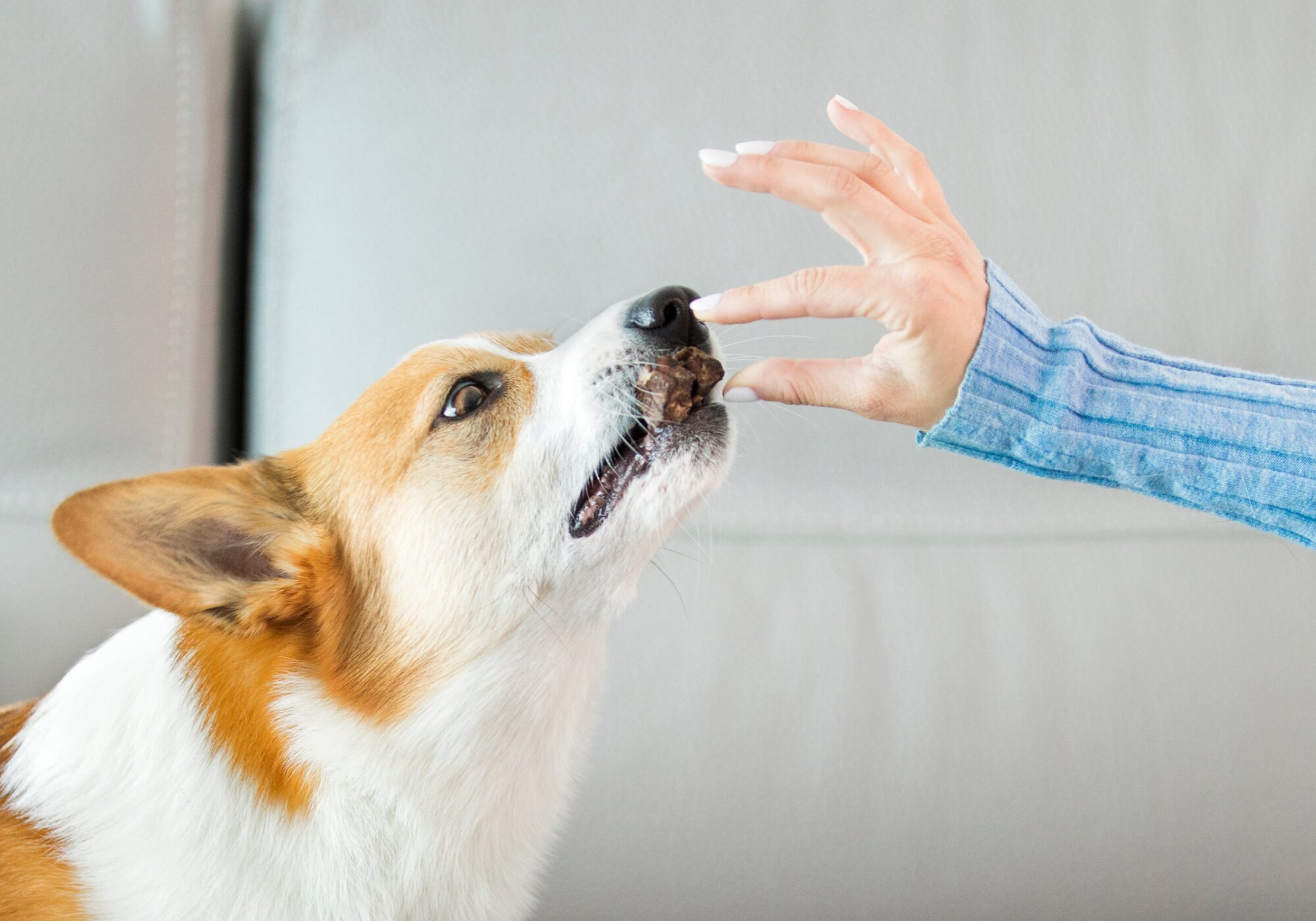Do you have a mix of adorable cats and dogs? Then you might have experienced a pet eating another's snacks and thought, "uh oh, what happens if my dog eats cat treats?"
There's a reason why each species gets their own treats. When dogs eat cat food (and vice versa) it can feel a little troubling.
But, does this mean they are dangerous for the other animal? Or is it okay if Fido has the occasional cat treat?
In this article, we'll cover:
- The history and benefits of treats
- The difference between cat and dog treats
- Can cats eat dog treats (and vice versa)
- 4 real foods for cats and dogs

What are the benefits of treats
To grow from puppies and kittens to strong and healthy dogs and cats, your pets need nutrition that supports their development. Your pet's food comes packed with the right components, so why do treats exist in the first place?
Dog treats started out as a happy coincidence. In the 1800s, an Ohio electrician traveled to London on business. He saw dogs feeding on dry biscuits meant for long-voyaging sailors and the dog biscuit was born.
Since that time, treats have morphed into many different shapes and sizes from dog chews to catnip. And while unnecessary for general health, treats are great for:
- Training your cat or dog
- Providing your pets with an indulgent treat
- Helping meet their nutritional needs
The last point has become increasingly true. Especially with the rise of supplements and other nutrient-packed treats making their way into the market.
The difference between dog treats and cat treats
There are some great benefits of treats for your canine and feline friends. But, what's the point of creating separate treats for each species?
It's no secret that cats and dogs are very different animals. They each have their own unique needs, personality traits, preferences, and health problems.
Here are a few reasons companies create separate food, treats, and nutritional supplements:
They have different nutritional needs.
Each animal has unique nutritional needs. Cat food, dog food, and treats in general have the right ingredients or nutrients to support your pet's health.
Nutrients are organized into a few categories, including:
Carbohydrates
Both species need the energy to stay active but need very little to maintain a balanced diet. Dogs need more carbohydrates (20%) in their diets than cats (10-15%). Brown rice and quinoa are good examples of healthy carbohydrates.
Fat
The amount of fat content included in cat and dog foods varies based on weight, age, and other health needs. Fats are great for boosting your pet's skin and coat, healing wounds, and managing inflammation. Some sources of good fat include chicken, beef, fish, and fish oil (like salmon oil).
Minerals
Certain minerals are essential to your pet's diet. Minerals are usually added by manufacturers to cat food and dog food. These include:
- Calcium
- Chloride
- Copper
- Iodine
- Iron
- Magnesium
- Manganese
- Phosphorus
- Potassium
- Selenium
- Sodium
Protein
High-protein treats are very common for both species. Protein helps keep your pet's heart, vision, reproductive system, and coat healthy.
10-11 essential amino acids need to be consumed through food — usually found in animal meat. These include:
- Arginine
- Histidine
- Isoleucine
- Leucine
- Lysine
- Methionine
- Phenylalanine
- Taurine
- Threonine
- Tryptophan
- Valine
Vitamins
If you feed your pets the right amount of cat or dog food, they are getting a balanced vitamin count to stay healthy. There are lots of vitamins that benefit cats and dogs.
Many treats have ingredients that contain a variety of vitamins. These include B vitamins, and vitamins C, D, E, H, and K. Cats tend to need vitamins A and B3 in their diets, while dogs need more vitamin D.
Dogs need vitamins and minerals that help with hip and joint mobility, gut and digestive issues, and skin and coat. Cats need certain ones that promote good digestion and bladder health. Vitamin supplementation isn't always necessary, so it's a good idea to speak to your vet beforehand.
Water
Water is one of the most important nutrients for your pets. Water helps regulate body temperature, break down nutrients, and keep your pet's joints healthy.
Dogs and cats need access to fresh water throughout their day to help digest their food, keep their joints lubricated, and flush out toxins.
They have different food preferences.
While both species are total meat eaters, they prefer different types of protein. Most cat treats are high-protein, meat-based treats. This is common because cats are obligate carnivores.
The most popular cat treats are usually made of:
- Chicken or turkey
- Salmon
- Tuna
- Shrimp
- Catnip
Popular dog treats are usually made with:
- Chicken or turkey
- Beef
- Pork
- Sweet potato
- Peanut butter
- Pumpkin
- Apples
They like different shapes, sizes, and smells.
Both types of treats are generally made in small and compact forms. This ensures they are easy to eat without impacting weight. It also helps ensure your pet gets the right amount of vitamins they need and won't get sick (if they accidentally eat the whole bag).
Cats are particular about their snacks. They are picky eaters so smell, taste, and texture are a big deal for them. They also have much smaller mouths, stomachs, and digestive tracts than dogs, so their treats tend to be a little smaller.
Dogs like to chew, unlike cats. Their treats tend to be of the chewing and gnawing variety like bones, antlers, or bully sticks.
Either way, it's a good idea to check the label to see how much protein, fat, and other nutrients your treats contain before feeding your pet.

Can dogs eat cat treats (and vice versa)
If you stumble upon your pup eating cat food, even in larger quantities, they are going to be fine. Dogs eat cat food and crave their treats because they have similar tasty ingredients, but with higher protein content.
So, it's not quite as common to see a cat eat dog food or treats. Primarily because of their picky food preferences.
Feeding your dog cat treats or cat food on a regular basis isn't detrimental to their health. But, it isn't recommended for the long term. And cats need much more specific vitamin and mineral counts, so it's best to avoid letting your cats eat dog food or treats.
If you're unsure, stick to the unique treats, food, and dietary supplements for each animal. This will be better for their quality of life and well-being.
Are cat treats bad for dogs
While cat food and the occasional cat treat aren't toxic to dogs, they could cause:
- Gastrointestinal upset
- Dull skin and coats
- Allergic reactions (depending on your dog)
Are dog treats bad for cats
Your dog's treats contain different nutrient counts and are often much larger than cat treats. Cats eat very similarly to dogs but large quantities of dog treats could cause:
- Weight gain
- Allergic reactions (depending on your cat)
- Kidney disease
Do your research, read nutrition labels, and check with your vet if you're unsure about the food or treats you want to give your pets.
4 treats that are safe for dogs and cats
If you're a healthy eater, you can share most foods that you eat with your pets. But some treats are harmful and can lead to severe health issues.
Here are four safe treats for dogs and cats.
Cooked meat and fish
Lean meat sources like turkey, chicken, and lamb are great options for your pets. Fish such as salmon or tuna are also great treats for dogs or cats. If you want to treat your pets with a little more protein be sure you cook them through and don't add extra seasoning.
Eggs
Eggs are an awesome source of iron, phosphorus, and vitamins A, B, D, and E. Both animals will love a little egg in their food, even a raw egg, as a tasty treat.
Veggies
There are lots of tasty vegetables that are good sources of vitamins and minerals and great options for your pets. A few simple veggies that are great for both include bell peppers, broccoli, carrots, cucumber, pumpkin, and zucchini.
Fruits
Most fruits have antioxidant properties and essential vitamins for your furry friends. But not all fruits are great for your pets. Some safe ones for both species include apples, bananas, blueberries, strawberries, and watermelon.
Conclusion
There are lots of snacks that are safe for cats and dogs to eat. But when it comes to human-related foods, there are many that are toxic to cats and sometimes dogs (onion and garlic, chocolate, grapes, etc.).
The main takeaway is that felines and canines are unique, so their nutritional needs are too. While sharing a few treats for dogs with cats (and vice versa) isn't harmful, it's best to avoid it for the long-term well-being of your pet.


